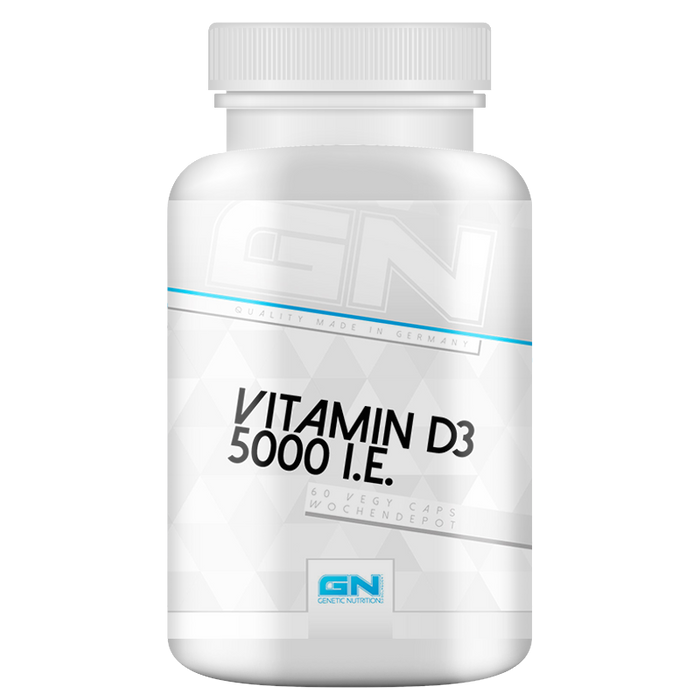
Vitamin D3 5000IE · 60 Kapseln
Vitamin D3 kann dein allgemeines Wohlbefinden und deine Gesundheit durch eine Unmenge positiver Effekte unterstützen. Dein Immunsystem, die Struktur deiner Zähne und Knochen aber auch deine Muskulatur können von einem optimalen Vitamin D3 Spiegel auf verschiedene Weisen profitieren. GN liefert auch Vitamin D3 wie gewohnt nur in der besten Qualität, damit jeder in vollem Umfang davon profitieren kann.
- Zahlreiche positive Effekte
- Hoch dosiert
- Vitamin D3 ohne Zusätze
- Leicht dosierbare Kapselform
- 100 % vegan
- Höchste Qualität – Made in Germany
Nährwerte und Inhaltsstoffe
| Zusammensetzung | pro Kapsel | % NRV |
|---|---|---|
| Vitamin D3 (Cholecalciferol) | 5000 IE (125 µg) | 2500 % |
Zutaten: Vitamin D3 (Cholecalciferol) Füllstoff: Microcrystalline Cellulose, Kapselhülle: HPMC.
*Prozent der empfohlenen täglichen Verzehrmenge laut Verordnung (EU) Nr. 1196/2011
**Keine Nährstoffbezugswerte (NRV) vorhanden.
Verzehrempfehlung
Nehmen Sie nicht mehr als 1. Kapsel alle 7 Tage mit viel Flüssigkeit
Hinweise
Die angegebene empfohlene tägliche Verzehrsmenge darf nicht überschritten werden. Nahrungsergänzungsmittel sollten nicht als Ersatz für eine ausgewogene und abwechslungsreiche Ernährung verwendet werden. Das Produkt ist außerhalb der Reichweite von kleinen Kindern zu lagern.
Quellen
(1) van Ballegooijen AJ, Pilz S, Tomaschitz A, Grübler MR, Verheyen N. The Synergistic Interplay between Vitamins D and K for Bone and Cardiovascular Health: A Narrative Review. Int J Endocrinol. 2017;2017:7454376. doi: 10.1155/2017/7454376. Epub 2017 Sep 12. PMID: 29138634; PMCID: PMC5613455.
(2) Reid IR, Bolland MJ, Grey A. Effects of vitamin D supplements on bone mineral density: a systematic review and meta-analysis. Lancet. 2014 Jan 11;383(9912):146-55. doi: 10.1016/S0140-6736(13)61647-5. Epub 2013 Oct 11. PMID: 24119980.
(3) Capozzi A, Scambia G, Lello S. Calcium, vitamin D, vitamin K2, and magnesium supplementation and skeletal health. Maturitas. 2020 Oct;140:55-63. doi: 10.1016/j.maturitas.2020.05.020. Epub 2020 May 30. PMID: 32972636.
(4) Chiang CM, Ismaeel A, Griffis RB, Weems S. Effects of Vitamin D Supplementation on Muscle Strength in Athletes: A Systematic Review. J Strength Cond Res. 2017 Feb;31(2):566-574. doi: 10.1519/JSC.0000000000001518. PMID: 27379960.
(5) Bartley J. Vitamin D: emerging roles in infection and immunity. Expert Rev Anti Infect Ther. 2010 Dec;8(12):1359-69. doi: 10.1586/eri.10.102. PMID: 21133662.
(6) Prietl B, Treiber G, Pieber TR, Amrein K. Vitamin D and immune function. Nutrients. 2013 Jul 5;5(7):2502-21. doi: 10.3390/nu5072502. PMID: 23857223; PMCID: PMC3738984.
(7) Rabenberg M, Mensink G. Vitamin-D-Status in Deutschland, 2016.12.14, DOI: 10.17886/RKI-GBE-2016-036
Holick MF. The vitamin D deficiency pandemic: Approaches for diagnosis, treatment and prevention. Rev Endocr Metab Disord. 2017 Jun;18(2):153-165. doi: 10.1007/s11154-017-9424-1. PMID: 28516265.
(8) Sizar O, Khare S, Goyal A, Givler A. Vitamin D Deficiency. 2022 Jul 27. In: StatPearls [Internet]. Treasure Island (FL): StatPearls Publishing; 2022 Jan–. PMID: 30335299.
(9) Khazai, N., Judd, S. E., & Tangpricha, V. (2008). Calcium and vitamin D: skeletal and extraskeletal health. Current rheumatology reports, 10(2), 110–117. https://doi.org/10.1007/s11926-008-0020-y.
(10) Chakhtoura, M., Bacha, D. S., Gharios, C., Ajjour, S., Assaad, M., Jabbour, Y., Kahale, F., Bassatne, A., Antoun, S., Akl, E. A., Bouillon, R., Lips, P., Ebeling, P. R., & El-Hajj Fuleihan, G. (2022). Vitamin D Supplementation and Fractures in Adults: A Systematic Umbrella Review of Meta-Analyses of Controlled Trials. The Journal of clinical endocrinology and metabolism, 107(3), 882–898. https://doi.org/10.1210/clinem/dgab742
Inhalt: 60 Kapseln Artikelnr.: 5011
